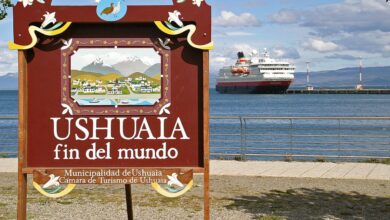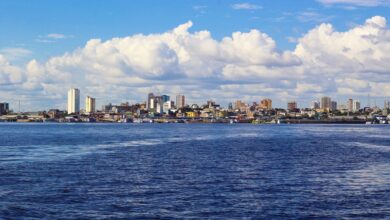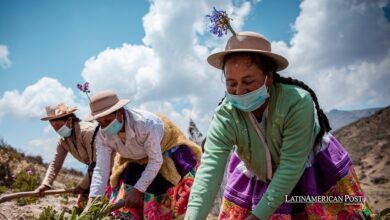This is How Latin America Positions Itself at COP 27
Latin America has a lot at Stake at COP 27, as it is one of the Regions Most Affected by Climate Change. We Tell you How the Region Arrives at this Conference and what the Positions of its Leaders and Organizations have been

Photo: TW-antonioguterres
LatinAmerican Post | María Fernanda Ramírez Ramos
Escucha este artículo
Leer en español: Así se posiciona Latinoamérica en la COP 27
The 27th Conference of the Parties to the United Nations Framework Convention on Climate Change, better known as COP 27. This event brings together heads of state, ministers and government representatives, civil society organizations, climate activists, multilateral organizations, academics, indigenous leaders and representatives of the private sector to negotiate climate policies and the roadmap to follow.
COP 27 will be held until November 18 on the coast of Egypt in the city of Sharm el-Sheikh and is surrounded by questions, both because of the disappointment left by COP26 and because of the questions to the Egyptian government.
Latin America and the Caribbean arrives at this event as one of the most important actors and very important factors for its future are at stake. From the institutional point of view, it is "an opportunity to align and strengthen development objectives with climate objectives and translate them into carbon-free and climate-resilient economies," as pointed out by the Inter-American Development Bank, IDB. However, fundamental decisions are also at stake in the progress towards climate justice, especially for the thousands of rural and indigenous communities that live day by day the negative consequences of the model of extractivism, excessive consumption and use of fossil fuels.
Overview of Latin America and the Caribbean at COP 27
It is a region that, despite its large size, according to information collected in the IPCC, has generated 11% of carbon emissions from 1850 to 2019 (North America and Europe together generated 39%). However, its forests constitute one of the largest carbon sinks. Likewise, around 522 indigenous peoples live there, with knowledge that is essential to understand sustainability and develop resilience to climate change, who have also acted as protectors of the forests.
As if that were not enough, in its territory there is a great wealth of minerals and materials that will be essential to face the energy transition, such as copper, lithium, graphite, rare earths or nickel, which makes it a strategic area for humanity. Likewise, it is a region with large extensions of fertile land and natural resources. However, for the same reason, it is one of the areas where there are more environmental conflicts and, paradoxically, it is estimated that it will be one of the most affected by climate change.
However, it is such a diverse region, not only in biodiversity, but also in its policies, vulnerability and management, that it does not negotiate decisions at COP 27 as a block. However, certain alliances, alignments and leadership have already been noted.
The decalogue to face the climate crisis proposed by Gustavo Petro
Latin America arrives at this COP 27 in a particular scenario, with the change of several of its presidents in a progressive trend. This was reflected in the Colombian president's speech at COP 27, which has been one of the most impactful, in the same way as it happened at the United Nations General Assembly. In it, Gustavo Petro called on the international community to be more ambitious with decisions and change the current model. "The global conferences of governments must put politics in command to generate a global plan to disconnect hydrocarbons immediately. Decarbonization is a real and profound change in the economic system that dominates," he said in his speech, which was presented like a decalogue.
One of the most noteworthy points is the call he made to the International Monetary Fund to think of a mechanism to exchange debt for investment in climate change mitigation and adaptation for developing countries. On the other hand, Gustavo Petro proposed creating a fund to save the Amazon and announced that Colombia will put 200 million dollars a year for this purpose. Likewise, Venezuela, Colombia and Suriname committed themselves to promoting this great Amazon agreement.
We recommend you read: Indigenous Leaders Activists Against Climate Change that you Should Know
The order of the small islands
Gaston Browne, Prime Minister of Antigua and Barbuda, spoke on behalf of the Alliance of Small Island States, which includes 16 Caribbean countries, on the need for economic compensation from large polluters to the most vulnerable countries. These islands have a very uncertain outlook with climate change due to the rise in sea level and the exacerbation of natural disasters, despite their low generation of greenhouse gases.
“The oil and gas industry continues to earn almost US$3 billion a day in profits,” the minister noted. Then, politician added that they must financially compensate for the damage they cause with their activity, through global carbon taxes. This position was also mentioned by Mia Mottley, Prime Minister of Barbados, who pointed out that given the need for financing to face the climate crisis, large companies must contribute to a loss and damage fund
The paradox of the intervention of Nicolás Maduro
The presence of Nicolás Maduro, Venezuelan president, has been widely commented on, both for his alliances to protect the Amazon and for his meetings with other leaders, despite questions about his regime. He questioned the production model and pointed out the immense global inequalities, motivated "by countries that have been indiscriminately exploiting the planet's natural resources for two centuries, while others barely have enough to feed themselves and persist under a pre-industrial mode of production." However, it is well known that the Venezuelan economy is based on a model of oil and gas extraction, which in some way has been the engine that has allowed him to maintain his regime, with various accusations of human rights violations.
Activists and indigenous peoples at the "foot of the canyon"
Despite the fact that COP 27 is an event highly questioned by environmental and climate activism organizations, hundreds of activists gather at this event to put pressure on governments and tell the world another side of this reality. Despite the financing difficulties, there are many young people who are in Egypt talking about their proposals, research, solutions and demands in the face of the climate crisis.
Likewise, indigenous peoples' organizations meet there to discuss the protection of their territories and the need to include their voices in decision-making. For example, in the Amazon pavilion, these leaders are organizing changes, launching reports with information and calling on the urgent need to save these territories from irresponsible consumption in order to put life at the center of the debate.




